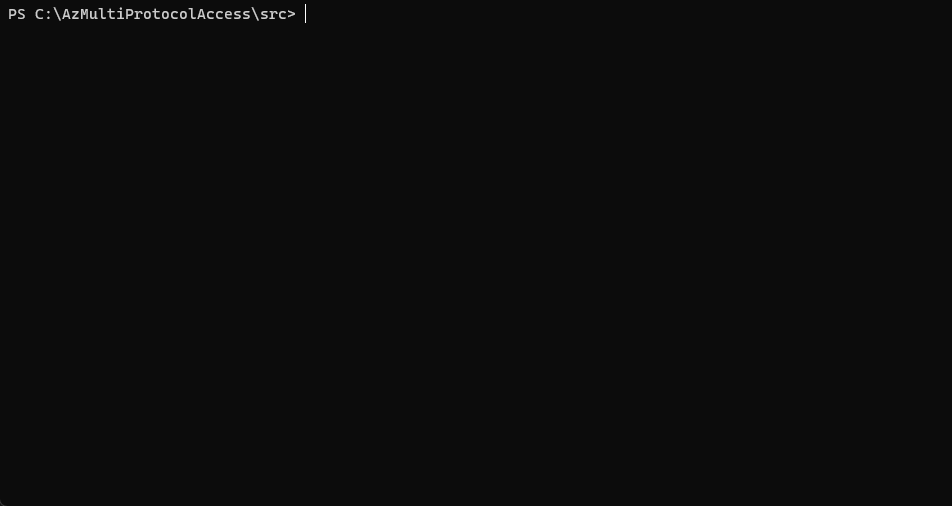| page_type | name | topic | description | languages | products | urlFragment | |||
|---|---|---|---|---|---|---|---|---|---|
sample |
AzMultiProtocolAccess |
sample |
AzMultiProtocolAccess is a sample application designed to showcase how to use Multi-protocol access on Azure Data Lake Storage Gen2.
|
|
|
azmultiprotocolaccess |
Azure Storage Multi-protocol access
AzMultiProtocolAccess is a sample application designed to showcase how to use Multi-protocol access on Azure Data Lake Storage Gen2. The following actions will be performed in sequence:
- Generating Fake Data
- Uploading files using Azure DFS API
- Listing files using Azure Blob API using a PageSize
- Downloading files using Azure Blob API
- Uploading files using Azure Blob API and keeping folder structure
- Listing files using Azure DFS API
- Downloading files and creating folder structure locally using Azure DFS API
Contents
| File/folder | Description |
|---|---|
src |
Sample source code. |
.gitignore |
Define what to ignore at commit time. |
CONTRIBUTING.md |
Guidelines for contributing to the sample. |
README.md |
This README file. |
LICENSE |
The license for the sample. |
Prerequisites
To use this sample, you need to have an Azure subscription. If you do not have an Azure subscription, you can create a free account before you begin. For more information, see Create an Azure free account.
All access to Azure Storage takes place through a storage account. For this sample, create a storage account using the Azure portal, Azure PowerShell, or Azure CLI. For help creating a storage account, see Create a storage account and enable hierarchical namespace for Multi-protocol access.
For authentication, Azure Active Directory is used. In this sample read and write operations are performed on a storage account. To grant access to the storage account, you need to grant your Identity at least "Storage Blob Data Contributor" privileges. For more information, see Authorize access to Azure blobs and queues using Azure Active Directory.
Using Azure CLI
# Create Ressource Group
az group create -n rgAzMultiProtocolAccess -l westeurope
# Create Storage Account with Hierarchical Namespace enabled
az storage account create --name YourAccountName \
--resource-group rgAzMultiProtocolAccess --location westeurope \
--sku Standard_LRS --enable-hierarchical-namespace
# Add Role Assignment and grant your Identity "Storage Blob Data Contributor" privileges
az role assignment create --assignee "user@tenant.onmicrosoft.com" \
--role "Storage Blob Data Contributor" \
--scope "/subscriptions/00000000-0000-0000-0000-000000000000/resourceGroups/rgAzMultiProtocolAccess/providers/Microsoft.Storage/storageAccounts/YourAccountName"Setup
Option one
Before running the sample, you must change "YourAccountName" in the src/Program.cs file (line 11) to the name of your storage account created in the step before.
private static readonly string storageAccountName = "YourAccountName";Option two
Assign the storage account name as a command line argument when running the sample.
dotnet run YourAccountNameRunning the sample
To build and run the sample, change to the src directory and execute the following command:
dotnet runKey concepts
For more information about Multi-protocol access, see the following articles:
Trademarks
This project may contain trademarks or logos for projects, products, or services. Authorized use of Microsoft trademarks or logos is subject to and must follow Microsoft's Trademark & Brand Guidelines. Use of Microsoft trademarks or logos in modified versions of this project must not cause confusion or imply Microsoft sponsorship. Any use of third-party trademarks or logos are subject to those third-party's policies.
